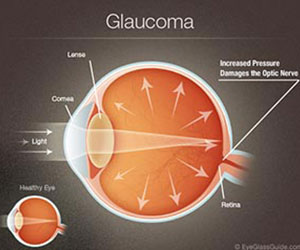

Glaucoma is a disease that damages your eye's optic nerve. It usually happens when fluid builds up in the front part of your eye. That extra fluid increases the pressure in your eye, damaging the optic nerve. The optic nerve is connected to the retina — a layer of light-sensitive tissue lining the inside of the eye — and is made up of many nerve fibers, like an electric cable is made up of many wires. The optic nerve sends signals from your retina to your brain, where these signals are interpreted as the images you see.
Form of Management:
Medical Management - Primary open angle glaucoma (POAG) is usually a chronic, slowly progressive disease. At present, all resources are directed towards reduction of intraocular pressure (IOP), the only known causal and treatable risk factor for glaucoma, and medical management is frequently the first choice in most cases. With the introduction of innovative tools for early diagnosis and newer medications for treatment, decision-making in diagnosis and treatment of glaucoma has become more complex.
Surgical Management - All glaucoma surgery procedures (whether laser or non-laser) are designed to accomplish one of two basic results: decrease the production of intraocular fluid (aqueous humor) or increase the outflow (drainage) of this same fluid. Occasionally, a procedure will accomplish both